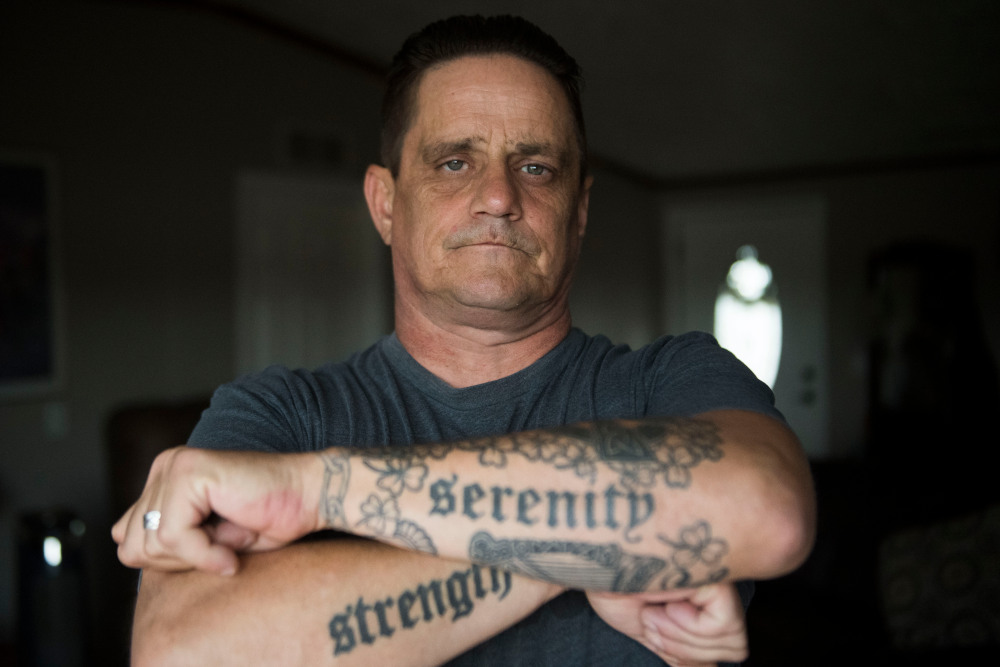
In this Aug. 30, 2018 photo, John Delaney shows off his tattoos after speaking about his experience being abused as a child by the priest at his childhood church in Philadelphia, in his Sevierville, Tenn. On Monday, Sept. 30, 2019, victim compensation funds in Philadelphia, Allentown, Scranton and Pittsburgh will close to applications. Delaney said fund administrators offered him $500,000 and told him that it was the highest amount they would offer. He turned it down, he said. Sober for three years and counseling victims of sexual abuse and people struggling with addiction in San Antonio, it was never about the money. It was about justice and getting into court where a judge can force church officials to testify under oath, he said. (Caitie McMekin/The Tennessean via AP)
When post offices close Monday, the last victim compensation funds at Pennsylvania's Roman Catholic dioceses will also close, hours before lawmakers plunge back into a years-old fight over whether to let long-ago victims of child sexual abuse sue perpetrators and institutions that may have covered it up.
It comes more than a year after last year's landmark grand jury report that accused senior Catholic Church officials of hushing up the abuse for decades.
In the report's wake, the Philadelphia archdiocese and six Pennsylvania dioceses opened victim compensation funds while state lawmakers fought to a standstill over giving now-adult victims of childhood sexual abuse a legal "window" to sue.
Many victims lost that right under Pennsylvania law by the time they turned 20, while victim advocates say the dioceses have deftly used the delay to limit their civil liability, aided in recent years by the Senate blocking House bills that sought to restore it.
On Monday, victim compensation funds in Philadelphia, Allentown, Scranton and Pittsburgh will close to applications. The Senate Judiciary Committee will hold a hearing Wednesday, with testimony from victims of childhood sexual abuse, constitutional scholars and others.
The timing is coincidental, Senate officials say.
Based on partial information available from the dioceses so far, compensation fund administrators have offered or paid more than $35 million to roughly 240 people.
The offers require a victim to give up the right to sue later and average about $125,000, said Ben Andreozzi, a Harrisburg-based lawyer who represents dozens of victims of Catholic clergy.
The vast majority of people who received offers took them, but that doesn't make the compensation funds a success, Andreozzi said.
"For these survivors, this program was essentially jammed down their throat because they had no other option and they acted in desperation," Andreozzi said.
Faced with the threat of a lawsuit, a diocese would have paid roughly twice as much and, in bankruptcy court, about three times as much, he said.
Senate President Pro Tempore Joe Scarnati, R-Jefferson, who led the chamber's opposition to changing the law, said dioceses have provided significant compensation to victims without making them relive their abuse in court or pay attorneys' 30% fees.
"In my view, it's been successful," Scarnati said.
Scarnati argues that retroactively giving adult victims a window to sue is unconstitutional, short of changing the state constitution. Attorney General Josh Shapiro, whose office produced the grand jury report, maintains that a window is constitutional and the question, ultimately, would be up to Pennsylvania's Supreme Court.
The dioceses say the compensation funds are one of many ways they are trying to help victims who come forward, and that they have long since changed, now strictly referring new complaints to law enforcement.
John Delaney, who said he was raped as a 12-year-old boy by a priest in the Philadelphia archdiocese, said fund administrators offered him $500,000 and told him that it was the highest amount they would offer.
He said he turned it down.
Delaney, 48, doesn't begrudge anyone who took an offer: many victims of childhood sexual abuse are in a lifelong battle with addiction or other troubles, and can't say no, he said.
For Delaney, who has been sober for three years and is counseling victims of sexual abuse and people struggling with addiction in San Antonio, it was never about the money. It was about justice and getting into court where a judge can force church officials to testify under oath, he said.
"This compensation program does not hold anybody accountable," Delaney said. "It doesn't give us an admission of guilt on the church's part."
The Associated Press does not identify victims of sexual abuse by name unless they give permission as Delaney has done.
The Legislature has changed in significant ways since the Senate last blocked the House legislation last year.
A critical mass of senators might back legislation to restore the right to sue, but the House took a different tactic this year under a new majority leader, Rep. Bryan Cutler, R-Lancaster, who opposes a window.
In April, the House passed a measure to amend the state constitution to allow victims of childhood sexual abuse to sue, even if they'd turned Pennsylvania's legal age limit, which is now 30.
Scarnati said he supports it. But amending the constitution couldn't happen before 2021 and requires passage by voters in a statewide referendum.
In the meantime, adults who were sexually abused as children outside of the Catholic Church still have no access to a compensation fund or to a court to confront a perpetrator, said Jennifer Storm, who heads the state's Office of Victim Advocate.
"So in the interest of fairness, we're asking the Senate to open that window to any and all survivors who come forward," Storm said.
Advertisement




